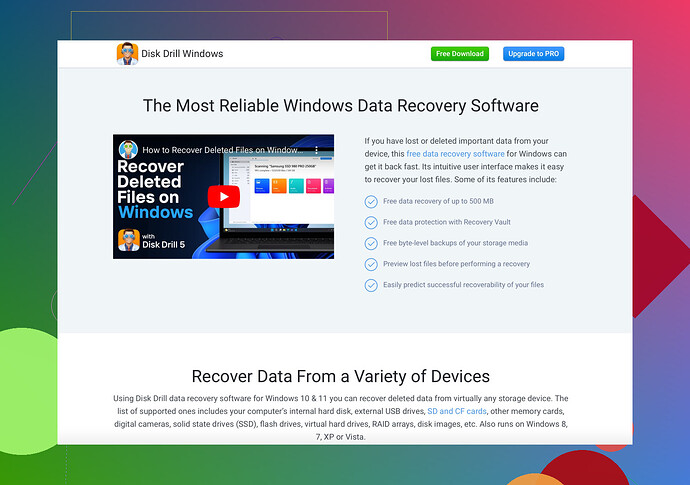I accidentally deleted some important files, and they are not in the Recycle Bin. I need these files urgently for a project deadline. Can someone guide me on how to recover them?
Oh no, lost your files and they’re not in the Recycle Bin? That’s a bummer. Don’t panic just yet, there are still ways to get them back.
-
Stop Using The Drive: First and foremost, stop any further activity on the drive where those files were stored. The more you use it, the higher the chance that new data will overwrite the deleted files.
-
Check Backups: Do you have any backups? Windows Backup, OneDrive, Google Drive, or any other cloud service you might be using?
-
File Recovery Software: If backups aren’t available, data recovery software could be your next best bet. I’ve been in this situation before and trust me, Disk Drill Data Recovery Software was a lifesaver. It’s user-friendly and digs deep into your system to find those lost files. Check it out here: Disk Drill Data Recovery Software.
-
Professional Help: If the files are really, really important, consider reaching out to a professional data recovery service. It’s a bit costly but might be your last resort.
-
Future Prep: For the future, consider setting up automated backups. An external hard drive or cloud storage can save a lot of headaches.
Hope this helps! Get that recovery software running ASAP and cross your fingers.
Alright, panicking over lost files is totally normal, but chill. You’ve got options! First off, viaggiatoresolare threw some solid advice your way, but let’s add a bit on top of that and mix things up:
Stop Everything
- Seriously, stop using the drive immediately to avoid overwriting potentially recoverable data.
Shadow Copies (Previous Versions):
- Windows has this sneaky feature called Shadow Copy that keeps previous versions of your files. Right-click on the folder where your files were, go to Properties, and then the Previous Versions tab. You might get lucky and find your files there.
Command Prompt Magic:
- If you’re not afraid to get your hands dirty, open Command Prompt with admin rights and try the ‘chkdsk’ command. Type ‘chkdsk /f’ followed by your drive letter, then ‘: /r’. Sometimes it recovers lost clusters of files.
Check for Temporary Files:
- Occasionally, programs save temporary versions of your files. Dig through the Windows Temp folder (Windows Key + R, type ‘%temp%’, press Enter) and see if there’s anything worth salvaging.
Alternative Recovery Software:
- If Disk Drill isn’t vibing for you, consider Recuva by Piriform. It’s another strong contender in file recovery.
Linux Live CD:
- If all else fails, try booting your computer from a live Linux CD (like Ubuntu). Sometimes Linux can see files that Windows thinks are gone.
Learn for the Future:
- Take a moment to think aloud, “I need a better backup system.” Services like CrashPlan or Backblaze can automate this and give you peace of mind.
In any case, click here to get started with Disk Drill, and dive deep into file recovery.
Don’t give up; those files are out there somewhere!
You’ve got a deadline, and lost files are a nightmare, but you can recover them even if they’re not in the Recycle Bin. Time’s ticking, so let’s dive in!
-
Check Shadow Copies: Right-click on the folder where your files were, choose Properties, then Previous Versions. Windows might’ve saved an earlier version.
-
Use File Recovery Software: Disk Drill is generally excellent; it’s user-friendly and digs deep, but it can be pricey. Consider alternatives like Recuva or PhotoRec—Recuva is free and solid for non-deep dives, while PhotoRec excels in raw file recovery.
-
Command Prompt Magic: Open Command Prompt as admin and type ‘chkdsk /f’ followed by your drive letter. It might help you find lost clusters.
-
Windows Temp Folder: Sometimes, temporary versions of your files hide here. Hit Windows Key + R, type ‘%temp%’, and press Enter.
-
Linux Live CD: Boot your computer using a Linux Live CD like Ubuntu to access files that Windows can’t see.
Pros of Disk Drill:
- User-friendly
- Can recover from multiple device types
- Extensive file type support
Cons of Disk Drill:
- Can be expensive
- Recovery might be slower with large drives
Competitors: Recuva is a good free option but less reliable, and PhotoRec, while excellent for raw recovery, can be complex.
Stop using your drive immediately and start with the above steps. Good luck!
